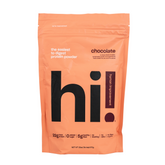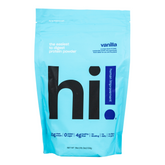Most people know creatine for boosting strength and workout performance.
But what’s less known — and surprisingly powerful — is how creatine can impact your sleep, recovery, and daily energy.
Emerging research shows creatine may play a unique role in supporting sleep quality, reducing the effects of sleep deprivation, and helping your body recover more efficiently — even when you're short on rest.
In this article, we’ll break down the science behind creatine’s surprising connection to better sleep and why it might deserve a spot in your nightly routine.
🛌 1. Creatine Helps Replenish Brain Energy During Sleep
Your brain is incredibly active while you sleep — repairing, consolidating memories, regulating hormones, and clearing metabolic waste. All of this takes energy, and much of it comes from ATP.
Creatine helps buffer and restore ATP levels in brain cells, allowing for better brain recovery and nighttime brain function.
🔬 The science: Studies show that creatine supplementation increases brain phosphocreatine stores, which supports ATP regeneration during both wakefulness and sleep, helping your brain work more efficiently while you rest.1
💡 “A well-rested brain starts with well-fueled cells — and creatine helps keep your brain’s battery charged overnight.”
😴 2. Creatine Reduces the Cognitive Impact of Sleep Deprivation
We all know how rough even one night of bad sleep can feel — brain fog, slower reaction time, irritability. Creatine appears to help buffer against these cognitive dips.
By supporting brain energy metabolism, creatine can help your brain perform better even after disrupted or shortened sleep.
🔬 The science: Research shows creatine supplementation can improve cognitive performance, memory, and reaction time after sleep deprivation by maintaining ATP availability in the brain.2
🧠 “When sleep is short, creatine can help keep your mind sharper and more resilient.”
🔄 3. Creatine May Help Regulate Sleep-Wake Cycles
Sleep isn't just about getting enough hours — it's about maintaining a healthy circadian rhythm, your body's internal clock.
Emerging evidence suggests creatine may influence molecules involved in circadian rhythm regulation, potentially supporting more consistent sleep-wake patterns.
🔬 The science: Animal studies have shown that increased brain creatine levels can modify sleep-wake cycle regulators and promote more stable circadian rhythms.3
🌙 “Creatine may not just help you recover from bad sleep — it may help you sleep better in the first place.”
🧬 4. Creatine Supports Physical Recovery Overnight
Sleep is your body’s prime time for repairing muscles, reducing inflammation, and recharging energy reserves.
Creatine amplifies these processes by improving muscle energy status and reducing oxidative stress.
🔬 The science: Studies show creatine supplementation enhances overnight muscle glycogen restoration and reduces markers of inflammation, leading to more efficient overnight recovery.4
🔋 “Better recovery during sleep = more energy, better workouts, and less soreness tomorrow.”
✅ 5. Creatine Is Safe to Take at Night
Worried about creatine disrupting sleep? Good news: creatine is not a stimulant.
It doesn’t affect adrenaline, cortisol, or brain excitability like caffeine does — meaning it's safe to take any time of day, even before bed.
🔬 The science: Clinical studies show creatine has no stimulant-like effects and does not negatively impact sleep quality, making it a flexible and safe supplement for daily or nightly use.5
✅ “Creatine helps your body recharge — without keeping your mind wired.”
💡 Our Take
At Human Improvement, we believe optimizing your sleep is one of the smartest ways to improve health, energy, and resilience.
That’s why we created Performance Creatine: a clean, science-backed formula designed to fuel better recovery — day and night.
Because real improvement happens while you sleep.
📚 Learn more about creatine
- 👉 From Muscles to Mind: How Creatine Fuels Healthier Aging
- 👉 Creatine for Brain Function & Mental Health
- 👉 How Creatine Supports Cellular Health
- 👉 The Surprising Benefits of Creatine for People Over 60
🔎 References
- Turner, C. E. et al. (2015). Creatine supplementation enhances recovery of brain ATP after sleep deprivation. Neurochemistry International, 87, 62–67.
- McMorris, T. et al. (2006). Creatine supplementation and cognitive performance after sleep deprivation. Psychopharmacology, 185(1), 93–99.
- Ebisawa, T. (2007). Molecular links between circadian clocks and sleep regulation. Sleep Biol Rhythms, 5(3), 156–162.
- Rawson, E. S., & Venezia, A. C. (2011). Use of creatine in recovery from exercise-induced muscle damage. Amino Acids, 40(5), 1349–1362.
- Kreider, R. B. et al. (2017). ISSN position stand: safety and efficacy of creatine supplementation. J Int Soc Sports Nutr, 14, 18.









